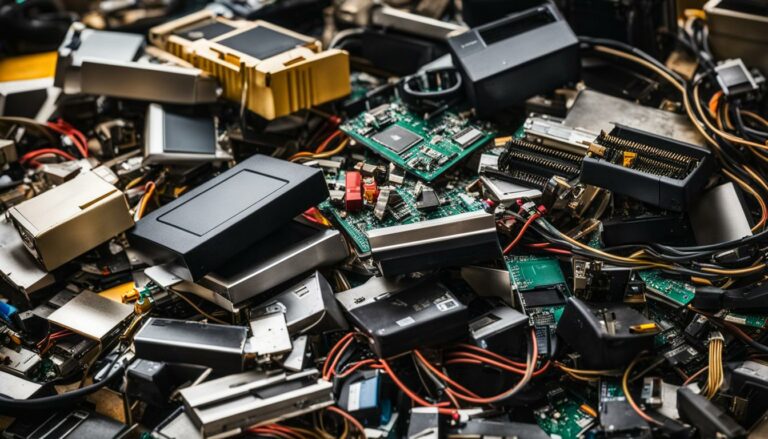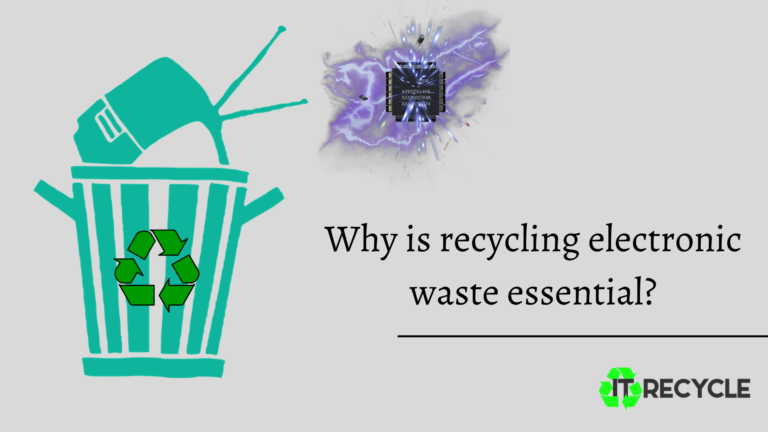The Economic Advantages of Computer Recycling
In an era where sustainability is more than just a buzzword, The Economic Advantages of Computer Recycling are gaining significant attention alongside the well-known environmental benefits. While it’s common knowledge that recycling computers helps in Reducing Landfill Impact and mitigating the Environmental Cost of IT Waste in Landfills, the economic aspect is often overshadowed. This comprehensive guide aims to bring this crucial facet to the forefront.
We’ll delve into a variety of economic benefits, from direct cost savings achieved by repurposing hardware to the job creation potential in the recycling industry. Additionally, we’ll explore revenue generation opportunities through the sale of refurbished electronics and the extraction of valuable materials. By the end of this article, you’ll have a well-rounded understanding of how computer recycling is not just a responsible environmental choice but also a financially rewarding one.
Cost Savings Through Repurposing and Reuse: Maximizing ROI on IT Assets
One of the most compelling Economic Advantages of Computer Recycling lies in the potential for significant cost savings through the strategic repurposing and reuse of hardware components. In today’s competitive business landscape, where operational efficiency is paramount, extending the lifespan of existing IT assets can offer a substantial return on investment (ROI).
Extending Hardware Lifespan: A Sustainable Business Strategy
Extending the lifespan of hardware is not just an environmentally responsible choice; it’s also a smart business strategy. By refurbishing older computers, you can delay the capital expenditure associated with purchasing new systems. This approach allows for better budget allocation and can improve your bottom line.
Component Harvesting: Unlocking Hidden Value
When an entire computer system becomes obsolete or non-functional, it’s easy to overlook the value of individual components. Harvesting parts like RAM, hard drives, or graphics cards for use in other systems can provide unexpected cost savings. This practice is particularly beneficial for organizations that maintain a large inventory of IT assets.
Reduced Waste Management Costs: The Financial Benefits of Responsible Disposal
The cost of waste management is an often-overlooked expense in IT operations. By properly recycling electronic waste, you can avoid fees associated with hazardous waste disposal and even benefit from tax incentives in some jurisdictions. This not only contributes to cost savings but also enhances your company’s sustainability profile, which can be a valuable marketing asset.
Vendor Partnerships: Leveraging Volume Discounts and Trade-In Programs
Many certified recycling companies offer volume discounts or trade-in programs that can further reduce the costs associated with computer recycling. By establishing long-term relationships with these vendors, you can negotiate better rates and maximize your cost savings over time.
By taking a strategic approach to repurposing and reusing hardware components, businesses and individuals can unlock the full range of Economic Advantages of Computer Recycling. This not only contributes to environmental sustainability but also offers a pathway to financial efficiency and improved ROI.
Job Creation and Economic Stimulation through Computer Recycling: A Multiplier Effect on Local Economies
The Economic Advantages of Computer Recycling extend far beyond the immediate benefits of cost savings. One of the most compelling aspects is the multiplier effect that recycling initiatives can have on local economies, particularly in terms of job creation and economic stimulation.
Employment Opportunities in Recycling Facilities: A Closer Look
Recycling facilities are becoming increasingly sophisticated, requiring a diverse range of skills. From technicians specialized in refurbishing hardware to quality control experts and logistics personnel, the employment opportunities are varied. These jobs not only provide stable employment but also offer avenues for career growth and skill development.
Entrepreneurial Ventures in E-Waste Management: The New Frontier
As the demand for responsible e-waste management grows, there is a burgeoning market for entrepreneurial ventures in this sector. These businesses not only generate revenue but also contribute to local economies by creating jobs and potentially exporting refurbished products or recycled materials.
Community Programs and Non-Profit Initiatives: Grassroots Economic Impact
Community-based programs and non-profit initiatives often employ local residents, thereby injecting money directly into local economies. These programs can also serve as training grounds for individuals to learn valuable skills that they can use in future employment opportunities.
Government Incentives and Public-Private Partnerships
Many governments offer incentives for companies to recycle, ranging from tax breaks to grants and subsidies. Public-private partnerships in the recycling sector can also lead to job creation and stimulate economic activity on a larger scale.
By taking a multi-dimensional view of the Economic Advantages of Computer Recycling, it becomes clear that the impact is not just individual or corporate but societal. The potential for job creation and economic stimulation makes computer recycling an integral part of sustainable development strategies.
Revenue Generation through the Sale of Refurbished Electronics: A Sustainable Business Model
The Economic Advantages of Computer Recycling extend beyond cost savings and job creation to include significant revenue generation opportunities. As technology advances, particularly with the rapid evolution of computer processors, consumers are frequently upgrading their devices. This creates a burgeoning market for second-hand electronics, offering a sustainable business model that turns e-waste into profit.
The Market for Refurbished Electronics: Understanding Demand and Supply
The demand for refurbished electronics is not just a trend; it’s a growing market segment. Consumers are increasingly looking for cost-effective and environmentally friendly alternatives to new products. This presents a lucrative opportunity for businesses and individuals involved in computer recycling to tap into this demand.
Quality Assurance and Certification: Building Consumer Trust
Working with certified recycling companies ensures that refurbished products meet stringent quality standards. This is crucial for maximizing revenue and building consumer trust. Certifications like R2 or e-Stewards can add value to your refurbished products, making them more appealing to discerning consumers.
Online Platforms and Marketplaces: Expanding Reach and Revenue
The rise of online platforms specializing in the sale of refurbished electronics has made it easier than ever to reach a global audience. These platforms often offer additional services like logistics and customer support, allowing you to focus on sourcing and refurbishing quality products.
Pricing Strategies for Refurbished Electronics
Determining the right pricing strategy for your refurbished products is crucial for maximizing revenue. Factors to consider include the age of the product, the cost of refurbishment, and market demand. A well-thought-out pricing strategy can significantly impact your profit margins.
By adopting a strategic approach to selling refurbished electronics, businesses and individuals can unlock a new revenue stream that is both economically advantageous and environmentally sustainable. This makes computer recycling a win-win solution that benefits not just the planet but also your pocket.
Material Recovery and the Circular Economy: Extracting Value from E-Waste
Another compelling aspect of the Economic Advantages of Computer Recycling is the potential for material recovery. As electronic devices contain various valuable materials like gold, silver, and rare earth metals, their responsible recycling can contribute to a circular economy while also offering economic benefits.
The Value of Precious Metals in E-Waste
Electronic devices often contain small amounts of precious metals, which, when aggregated, can be of significant value. The process of extracting these metals for reuse in new products not only contributes to sustainability but also offers a lucrative revenue stream.
Rare Earth Metals: A Finite Resource
Rare earth metals like neodymium and dysprosium are essential in the manufacturing of modern electronics. Given their finite availability and geopolitical implications, recovering these metals from e-waste is not just environmentally responsible but also economically strategic.
Upcycling: Beyond Recycling
Upcycling involves creatively repurposing electronic components into new products, adding value beyond their original function. This practice not only diverts waste from landfills but also creates new economic opportunities for artisans and small businesses.
The Circular Economy: Closing the Loop
Material recovery is a crucial component of the circular economy, a model that aims to minimize waste and make the most of resources. By recovering and reusing materials, businesses can reduce their production costs and environmental impact, thereby enhancing their economic competitiveness.
By focusing on material recovery, businesses and individuals can tap into yet another dimension of the Economic Advantages of Computer Recycling. This approach not only contributes to a more sustainable future but also offers tangible economic gains, making it an integral part of any comprehensive recycling strategy.
Challenges and Future Prospects in Computer Recycling: Navigating the Road Ahead
While the Economic Advantages of Computer Recycling are numerous and compelling, it’s essential to acknowledge the challenges and roadblocks that can impede progress. Understanding these challenges is crucial for navigating the complexities of this evolving industry.
Regulatory Hurdles: Compliance and Legislation
One of the most significant challenges in computer recycling is navigating the complex landscape of regulations and compliance requirements. Failure to adhere to these can result in hefty fines and legal repercussions, negating any economic advantages gained.
Technological Limitations: The Need for Innovation
As electronic devices become increasingly complex, so do the challenges associated with recycling them. Technological innovation is needed to develop more efficient methods for material recovery and component refurbishment.
Market Awareness: Educating Consumers and Businesses
Despite the clear economic advantages, there is still a lack of awareness among both consumers and businesses about the benefits of computer recycling. Educational initiatives are needed to drive market demand and make recycling more mainstream.
Future Prospects: Sustainability and Economic Growth
Looking ahead, the future of computer recycling is promising. As sustainability becomes a more significant factor in consumer choices and business strategies, the economic advantages of computer recycling are likely to become even more pronounced.
By understanding both the challenges and future prospects, we can better appreciate the full scope of the Economic Advantages of Computer Recycling. While obstacles exist, the potential for economic gain and environmental sustainability makes computer recycling an area ripe for growth and innovation.
Conclusion: The Multifaceted Economic Advantages of Computer Recycling
As we’ve explored throughout this comprehensive guide, the Economic Advantages of Computer Recycling are manifold. From direct cost savings, which show how computer recycling saves money, to job creation through computer recycling and revenue generation through computer recycling, this practice offers a plethora of opportunities for economic gain.
While challenges such as regulatory compliance and technological limitations exist, the future prospects in computer recycling for economic gain are promising. Material recovery, a crucial component of the computer recycling and the circular economy, further adds to the economic benefits.
Computer recycling is not just an environmentally responsible choice; it’s also an economically strategic one. As the world continues to grapple with the challenges of sustainability and resource management, the economic benefits of recycling computers will likely become even more pronounced. By adopting a holistic approach that considers both environmental and economic factors, businesses and individuals can contribute to a more sustainable future while also enjoying tangible financial benefits.















